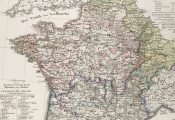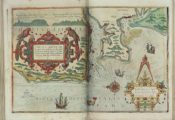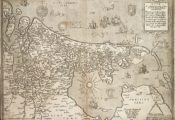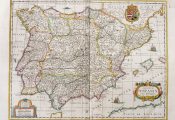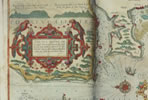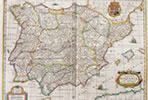Domestic troubles
The harsh treatment of French Protestants, the Huguenots, seriously set back the development of the country’s overseas trade and settlement. Although among France’s most prominent and enterprising business people, the Huguenots were persecuted and massacred, and many fled to the Netherlands, England and the Americas. The group that would have financed and managed oceanic trade and commerce was lost to France – to the nation’s great economic disadvantage.
In addition, the emigration of French settlers overseas was smaller, and slower, than the English equivalent. This partly explains why French colonial development lagged behind its English counterpart. The personal impulses behind migration and overseas trade – the willingness of individuals and small groups to take risks and work together in dangerous maritime ventures – were much less common in France.
On top of that, in the early 17th century, just when the English state was actively encouraging and supporting such ventures, the French monarchy was preoccupied with its political struggles against both the Huguenots and rebellious aristocrats. While the English were settling a string of key colonies in North America and, especially, the Caribbean, the French were bogged down by domestic troubles.
Coming late to the table
The French state sponsored and encouraged missionary drives into the Americas, led mainly by Jesuits. But the conflicts with the Huguenots and uprisings in a number of French ports on the Atlantic made the monarchy wary of the very regions that would have sustained overseas expansion and trade. It was precisely such port cities and regions (Bristol and the South-west, Liverpool, Lancashire/Yorkshire) that helped propel England to the forefront of the transatlantic slave trade. The result was that France came late to the table and missed out on the opportunities created by adventurous merchants and sailors from elsewhere in Europe, notably Britain.
Although there was strong support for colonial settlement and overseas trade, it tended to come, not from entrepreneurs, but from French ministers and advisers. And their aim was to use it as a means of promoting Catholicism beyond the seas while keeping it under royal control. This was in sharp contrast to the English approach. Although the French created successful settlements in Canada (including agreements with local indigenous peoples), the numbers of French settlers involved were tiny – there were perhaps only 2,000 in Quebec in 1660. By then, the English had settled a substantial army and its followers in Jamaica, and Barbados was home to more than 20,000 European people.
Lagging behind
France also came late to the slave trade. A company set up to trade in Guinea received a royal charter in 1635 and the French slave trade was formally authorised 13 years later – but on condition that the enslaved Africans were converted to Christianity. By then, the English had trafficked perhaps 100,000 Africans across the Atlantic. This meant that French planters in the Caribbean who needed African captives had to secure slave labour from Dutch traders.
The end result was that France’s involvement in the slave trade and in slavery lagged behind that of other major European maritime nations. But during the course of the 18th century, France was to catch up and, on the eve the revolution of 1789, threatened to surpass the dominant slave trading power, the British – thanks largely to the explosive expansion of the French slave colony of St Domingue (now Haiti).
